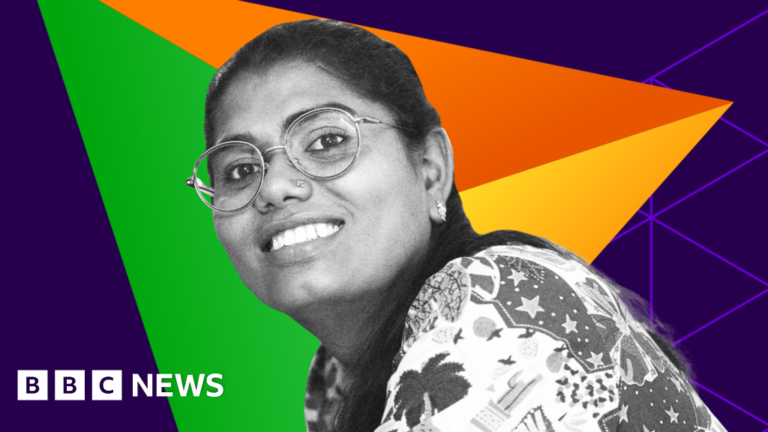Zoya Mateen,BBC News, Delhi
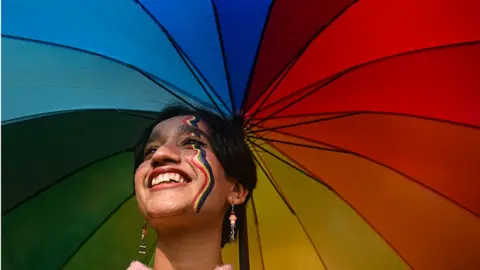 Getty Images
Getty ImagesMadhu Bai says she is like a rainbow – emerging from the storm, spreading a brief moment of joy and then disappearing back into the sky.
The 44-year-old made history in 2015 when she became the first transgender person elected as mayor in India, in Raigarh, a small town in the central state of Chhattisgarh.
But when her term ended in 2020, Madhu returned to her old life, without a pension or government handouts. She now dances and sings with other hijras (transgender women) at weddings and birth ceremonies, a common livelihood for India’s transgender community.
Madhu has no plans to return to politics, saying he is tired and believes politics has become too polarised.
“I fought, I won, I worked for my people. Now I want to live for myself.”
Madhu’s brief but successful foray into politics in India is unusual in a field where the LGBTQ community remains largely underrepresented.
Activists say this is puzzling in a democratic society where acceptance of sexual and gender diversity has grown and the community has won many victories.
More than half of Indian adults believe in same-sex marriage Should be legalAccording to a Pew Research Center survey.
But LGBTQ Indians can’t just rely on the Supreme Court’s ruling to bring about change. Do not legalize same-sex marriage It was proven last year.
The judge declared that changing the law was a matter for politicians, not the judicial system.
Activists say LGBTQ politicians are the community’s best advocates, but no major political party has fielded an openly LGBTQ candidate in this year’s general election.
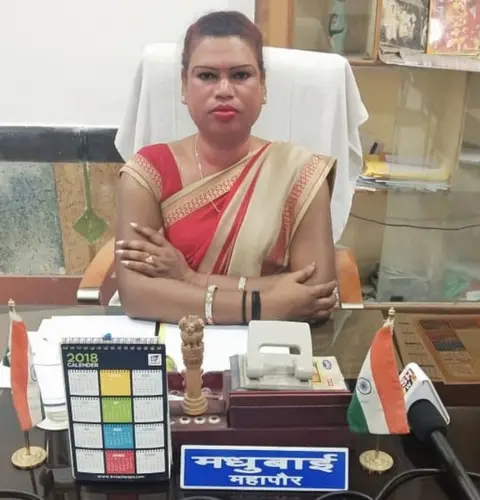 Madhu Kinnar
Madhu Kinnar
“For so long, queer people have been left out of the conversation and told that politics is not for them,” says Anish Gawande, author and founder of Pink List India, India’s first archive of politicians who support LGBTQ+ rights.
“They never had the opportunity to build the organization they needed to assert their demands.”
No one knows this better than Madu, who says overcoming the ridicule and scorn of her opponents was less of a challenge than winning the support of voters who quickly warmed to her.
She and friends spent days canvassing door to door to raise funds for her campaign, but struggled to secure party tickets.
Elections in India are expensive, and running independently without political funding is even more expensive, but having been rejected by both major parties, she had no choice.
She thought that when she won, the leaders would take her seriously, but that wasn’t the case.
She says that at her first meetings, members of several political parties walked out, that local leaders were so upset about her dancing videos that they threatened to slap her, and that there were days early on when she didn’t feel comfortable using the women’s bathroom in the presence of party members.
“People loved me and my work, but my rivals hated me wholeheartedly,” she says. “Behind the ridicule and abuse, I know they were all thinking the same thing: ‘Hijras are the worst.’ of Mayor? ‘”
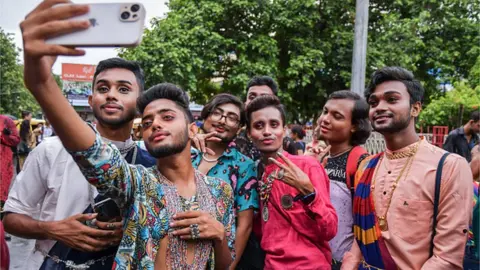 Getty Images
Getty ImagesActivists say the situation has changed since Madu was elected.
Today, more Indians know of LGBTQ people than a few years ago, and politicians who were once cautious on the issue are now LGBTQ advocates and promising more rights.
“Indian political parties are slowly coming out of the closet and talking more openly about LGBTQ rights,” says Harish Iyer, one of India’s first openly gay politicians (he retired from politics last year).
According to Iyer, there is also a growing sentiment among young people to “eliminate homophobia once and for all.”
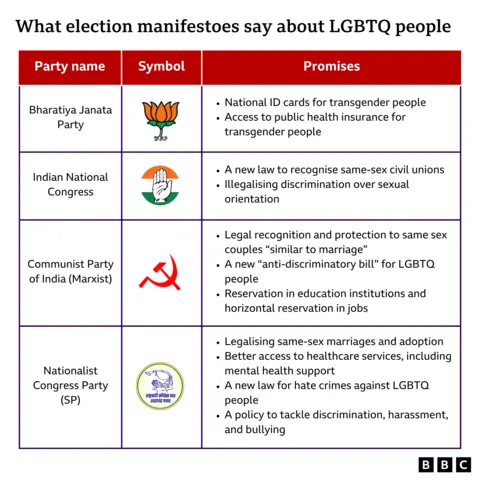

This year’s election campaign comes just months after the Supreme Court decided not to legalize same-sex marriage.
All three opposition parties have pledged to legally recognise same-sex unions, but not the ruling Bharatiya Janata Party (BJP), which opinion polls suggest will win a historic third term.
Nonetheless, Gawande argues that LGBTQ rights is a trend that Indian politics can no longer ignore: the community’s social and cultural capital “far exceeds its strength in numbers,” he says.
He expects victories in the near future regarding relationship recognition, affirmative action for transgender people and access to health care.
Some of these struggles may not get much attention, especially those that affect poor people who are on the front lines and are excluded from jobs, education and political opportunities.
“The LGBTQ struggle needs to be seen through the lens of caste privilege,” said Grace Banu, a Dalit (formerly untouchable) transgender woman activist from the southern state of Tamil Nadu.
Born into a poor family, she first faced caste-based discrimination and later gender-based discrimination.
When she came out at 14, her school punished her by banning her from classes and making her sit under a tree, and when she resisted, her parents committed her to a psychiatric hospital to “cure her.”
“I told myself this wasn’t my destiny,” she says. “One day I ran away to take charge of my own destiny.”
Today, Banu is a software engineer and the first transgender woman to earn an engineering degree in the state, and identifies as the mother of 12 transgender women.
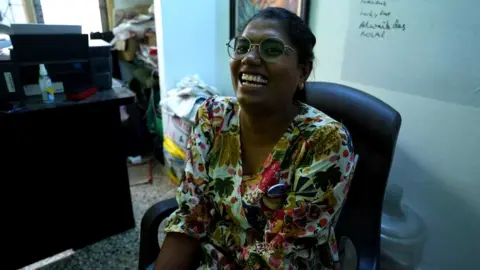
She lives in Chennai with her family of three other transgender women, all of whom are also involved in anti-caste and transgender rights movements.
As they lie in their living room, the two share a passionate conversation about their lives, ranging from discussing their upcoming legal battles to deciding what to have for lunch.
“Transgender and LGBTQ identities are not monolithic,” Bhanu said. Her friends were busy in the kitchen, the clanging of dishes occasionally shattering the afternoon silence.
The 44-year-old recently petitioned an Indian court to create a “horizontal quota” – a separate quota – for transgender people in government jobs within existing quotas for historically disadvantaged communities.
Bhanu stresses that being transgender varies greatly across caste and class, and her fight is focused on those who are most marginalized, she says.

On the other side of Chennai, in a luxury apartment building by the sea, lives Apsara Reddy, a transgender woman and spokesperson for the AIADMK, one of the main political parties in Tamil Nadu.
A former journalist with degrees from Australia and the UK, Reddy lives a lavish lifestyle, driving a shiny silver Jaguar, collecting art and wearing the finest silk saris.
While Reddy acknowledges her privilege, she says, “In politics, you have to look at the bigger picture. You can’t just represent your community.”
Reddy has never contested elections, but if he did, he wouldn’t want to be pigeonholed as the party’s “LGBTQ standard-bearer.”
“If you want to judge me, judge me based on my potential as a policy maker, not on my gender identity.”

Activists say few in the LGBTQ community are able to come out like Reddy, much less consider a career in politics.
Gawande suggests that for a long time, community was not a political priority.
He says the fight for equality being waged in the courts makes it harder to build relationships with other marginalized communities in the broader fight for equality.
He now wants the community to focus on grassroots political activism, which he believes will raise awareness of LGBTQ issues.
But Iyer believes the ball is now in the hands of the country’s leaders: “We are your friends, your family, your customers and your beneficiaries. We are everywhere, but you are not looking for us. When we are called, we come to you. That is what we expect from political parties.”
Back in Raigarh, Madhu says not having a fixed salary can make life difficult, but given her life so far, she cannot predict what the future holds.
“Whatever it is, it’s definitely not politics,” she says, erupting into a bubbly, sing-song laugh.
But she hopes others in the gay community will also seek political opportunities, so that gay people are no longer seen as strange.
“Perhaps then rainbows will appear again in this country.”
The video was shot by Prem Bhoominathan and edited by Danish Alam.

